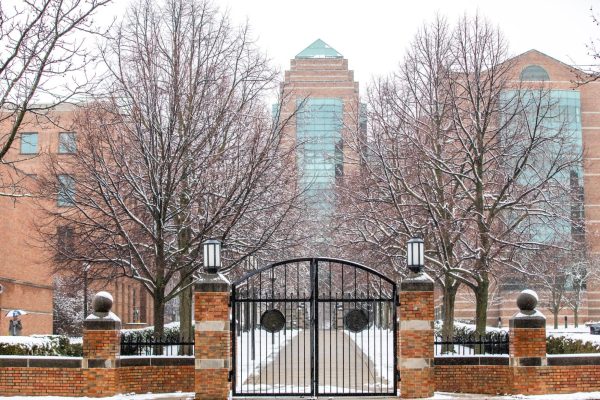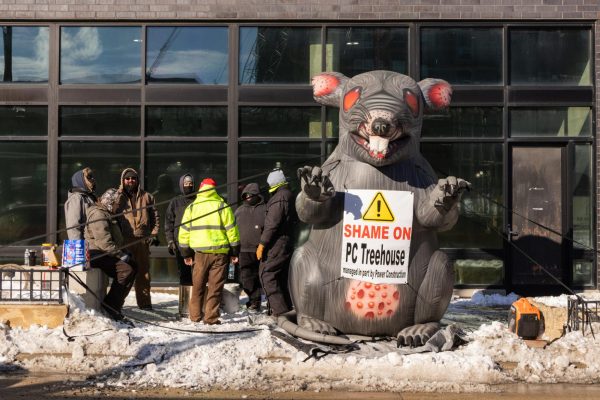The American nightmare
Mar 16, 2015
Last week, the University of Illinois Cline Center for Democracy hosted its 20th Cline Symposium. The symposium comprises a keynote speaker, faculty lead round table and small group discussion for the participants.
Each year, professors are given the opportunity to nominate students to participate in the symposium. The annual public affairs forum brings notable speakers and researchers from around the country and focuses on student engagement. This year’s focus was “Restoring the Promise of Higher Education.”
As a nominated participant, I had the opportunity to hear from the leading academics in the field of public policy, including Dr. Suzanne Mettler from Cornell University. The speakers took a critical look at higher education. American universities have always been intertwined with the “American Dream.” James Truslow Adams put it best when he said, “Life should be better and richer and fuller for everyone, with opportunity for each according to ability or achievement.” American universities are supposed to provide anyone with the opportunity to achieve their dreams.
However, after two days of talks, conversations and debates, I have no choice but to conclude that the American Dream is dead.
The American university system is without a doubt one of the best in the world. In the 2010-2011 academic year, 723,277 foreign students came to United States’ universities with the knowledge that they would be receiving an unparalleled education.
Get The Daily Illini in your inbox!
On the surface, this sounds like good news. The United States has the educational infrastructure required to ensure its global intellectual supremacy. But the problem is, the high quality of education needed to be successful in today’s global economy is limited to a select few.
In 1848, Horace Mann invented a higher education myth. He claimed institutions of higher learning were the “great equalizer,” the foundation of American social mobility. By providing everyone with high level learning, everyone has an equal chance to succeed. In 2011, Arne Duncan, U.S. Secretary of Education echoed Mann, stating, “In America, education is still the great equalizer.”
Still, it seems Duncan and Mann couldn’t have been farther from the truth about higher education in America.
According to the Pew Research Center, 81 percent of high-income high school graduates enroll in two or four year institutions. Only 51 percent of low-income high school graduates are able to have that same privilege.
The vast majority of Americans do not have the opportunity to go an institution of higher learning. Those who are at the bottom of society are excluded from the so called “great equalizer.”
But that’s just high school graduates. There are still students who drop out of high school, like students in the nine states with a graduation rate of less than 65 percent for low-income students. Conversely, there are 14 states with a graduation rate higher than 90 percent among students of higher income levels.
The reality is, if you are from a low-income family and attending college, you are the exception.
I am sick and tired of hearing that the American Dream is alive and well. That phrase is a useless trope. The United States is ranked 13th out of the 17 advanced economy countries in terms of social mobility. Your parent’s wealth is directly related to your future earnings in this country.
To those who are thinking about the story of your grandparents, or your uncle or your uncle’s girlfriend’s sister who started out with nothing, and is now incredibly successful, let me stop you for just a second. The American idea of being able to “pull yourself up by your bootstraps” is as fundamental to American identity as the Stars and Stripes.
Everyone has a story of someone who defied the odds and made it big in the end. But nobody stops to think about why those stories exist. If people were escaping poverty with any degree of regularity, these stories wouldn’t be told. The bootstrap story is inspiring because it is rare.
It almost seems like you have a better chance winning the lottery than succeeding without a college degree, and far too many people don’t get to make that choice for themselves. All of the statistics above show that low income earners are denied access to college. We cannot claim to be an egalitarian and socially mobile state if a huge group of individuals can’t even get on the playing field.
People far more qualified than me have been fighting over higher education reform for decades. I refuse to pontificate about something so complicated with the knowledge I have. But I do know this: People have faith in the American Dream. People believe that in the United States, you can go anywhere with your own pluck.
Thomas is a freshman in LAS.






